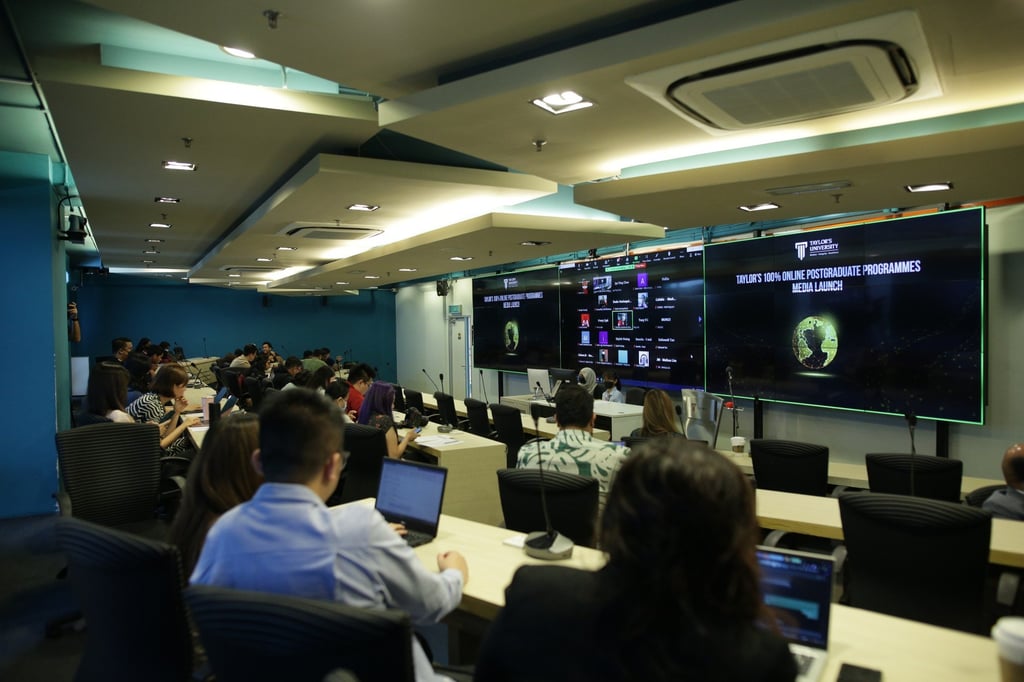Why online postgraduate programmes prove a good option for busy professionals in post-Covid-19 world
- Digital revolution in new technologies means firms are keen to recruit graduates with enhanced skill sets, says Professor Dr Pradeep Nair of Taylor's University in Malaysia
- Private university offers a range of flexible online master’s degree programmes with bite-sized ‘nano-learning’ content accessible around the world at any time

[Sponsored article]
The continuing effects of the Covid-19 pandemic, which triggered widespread lockdowns, social-distancing restrictions and halted passenger flights worldwide, have sparked greater interest and acceptance of new technological innovations, including remote working practices and online learning.
It has led to a major shift in the way many businesses, schools and universities operate, including the growing demand to adopt innovative new ways of providing postgraduate education.
Taylor’s University in Malaysia – named Southeast Asia’s No 1 private university for a third year in the latest annual ratings of global higher education institutions, QS World University Rankings 2023 – has curated 100 per cent online postgraduate programmes for today’s busy professionals to pursue lifelong learning anytime, anywhere around the world.
The programmes feature what the university describes as “nano-learning”, with topics divided into small, bite-sized videos and interactive content so that students can access course content remotely at their own pace – from anywhere in the world and at any time.
The university – located in Subang Jaya, Selangor, which has been one of the pioneers of online education for more than a decade – also lies 49th in the QS Asia University Rankings 2023 and 284th in the QS World University Rankings 2023, placing it among the top 1 per cent of the most influential universities globally.
It is the only private university in Southeast Asia to break into the top 50 of Asia’s best universities list and was also placed 16th globally for its Graduate Employment Rate indicator in last year’s QS Graduate Employability Rankings.
Digital revolution sparks demand for new skills

Professor Dr Pradeep Nair, deputy vice-chancellor and chief academic officer of Taylor’s University, says demand for postgraduate education worldwide has “exploded”.
The global digital revolution has sparked the rapid progression and fusion of technologies, including artificial intelligence, robotics genetic engineering and the Internet of Things – the online connection of data-sharing devices embedded in everyday objects – which has encouraged many graduates to enhance their skills, he says.
“Up to 42 per cent of the core skills required to perform existing jobs are expected to change,” Nair says. “At the same time, new jobs are being created, and many working adults feel that a postgraduate qualification will help them unlearn and relearn new knowledge.”
There is also a need for people to acquire new, multidisciplinary skills. “The blurring of lines between industries and different areas of knowledge has given rise to the emergence of new types of companies, which have emerged from two or more core disciplines. They actually require a workforce that is informed about more than just one field of expertise,” he says.
An increase in the use of automation, accelerated by the pandemic, has also helped to drive the quest for new skills. “We’ve seen how the pandemic transformed even the most reluctant businesspeople,” Nair says.
“Small and medium-sized enterprises that were very comfortable doing things manually found a way of doing their work more efficiently with fewer staff.”
Nair says the Swiss non-profit foundation, World Economic Forum, predicts that 85 million jobs globally will be lost to automation by 2025. But he expects that in the future, automation will end up creating even more jobs, although they will require workers with new skill sets.
Programmes tailored to today’s busy professionals

Growing demand for online postgraduate programmes has now outstripped traditional programmes, he says. This is because the pandemic has helped to change perceptions that remote, online studying is inferior to face-to-face studying, while the increased use of advanced education technology means students can now enjoy a greater level of interactivity and course flexibility.
Nair says Taylor’s University has designed its online postgraduate programmes to accommodate the busy schedules of professionals juggling a work-life-study balance.
They feature a nano-learning method, designed to appeal to those with shorter attention spans, such as individuals with personal responsibilities and members of Generation Y – those born between the early 1980s and the late 1990s – and Generation Z, born between the late 1990s and the early 2010s.
The university’s nano-learning content is all produced in-house by its experienced learning designers, programmers and audio-visual team, to ensure that content can be easily updated for relevance and customised to students’ needs.
“We take what used to be taught in over an hour, and break it up into nothing more than about five minutes for each nano-learning topic … pretty much like how people consume Instagram stories,” he says.
“They get to watch a video, consume content, interact with learning facilitators or with peers, and post their own views while learning.”

To avoid the high dropout rate often associated with online learning, Taylor’s University has put the emphasis on social learning so that postgraduate students are constantly engaged and do not feel alone while pursuing the programme.
If students require additional support, they can also contact learning facilitators to seek clarification, as well as request one-on-one sessions.
Frequent networking sessions – vital to any postgraduate course – including roundtable discussions, forums, webinars and meetings with industry leaders, are also organised for the Taylor’s University programmes’ intake of students.
The university has also been awarded the QS 5 Stars rating for online learning, which is based on the ability of institutions to deliver online distance learning or blended learning programmes.
The ranking is based on criteria such as the level of student-faculty engagement, quality of student interaction, access to online libraries or databases and the faculty-to-student ratio.
Nair says there has been growing demand for its online postgraduate programmes among workers who want to gain additional qualifications and skills to help them compete in the increasingly competitive world of business.
“For those who have a first degree and are now doing their postgraduate studies while keeping their job, Taylor’s range of 100 per cent online postgraduate programmes is a great option for them,” he says.